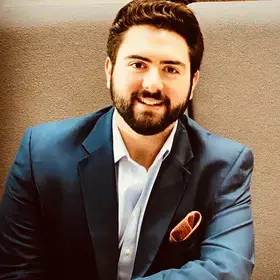Pachara Palm Naripthaphan, ’19SPS Negotiation and Conflict Resolution, had been working in some of the highest levels of the Thai government, serving in roles ranging from assistant to the Deputy Prime Minister to Press Secretary for the Ministry of Energy. A lifelong learner, Palm wanted to expand his competencies in peacebuilding and conflict resolution but needed to continue working and taking care of his growing family in Thailand. When Columbia opened an online (with residency) option of its M.S. in Negotiation and Conflict Resolution program, Palm immediately applied. While he values all of his degrees, Palm says Columbia’s NECR program challenged him in new, dynamic ways. We asked him about his experience with the online (with residency) program.
When did you begin considering getting a master's degree and why?
I had been working for seven years before the opportunity opened. It’s a dynamic process considering all the factors – family, work, income and a desire to learn. Most Thais continue their master’s degree right after their bachelor’s, but gaining work experience helped me to grow professionally and personally. That makes the degree special because it’s not just another piece of paper on the wall; it signifies a deep understanding of negotiation in both theory and practice.
What made Columbia the right choice for you? Why did you choose to take the online (with residency) program option, specifically?
While I found the curriculum was very interesting, it hadn’t been a viable option for me until the program opened the online format. Moving my family of 6 to New York City just wasn’t feasible – and I had to continue working. The combination of online learning with in-person intensives helped me to continue keeping my outside obligations and it made me feel challenged. I have a bachelor’s and my first master’s from highly reputable institutions, but they didn’t quite challenge me in the same dynamic ways that Columbia did. This program was perfect for me.
What was the Columbia experience like for you as a student from Thailand?
New York City is fascinating, and Columbia is even more to behold. I was raised with an American style of education, so I didn’t have to adjust much. New York City is vibrant and multicultural, so being a foreigner does not really make me an outsider; it makes me feel at home in a way. As a political scientist, I’m a staunch fan of Alexander Hamilton. Attending the intensives at Columbia meant more to me than just the name recognition; it was an honor to learn at an institution that educated someone I idolize. I got the chance to walk where Hamilton walked and reflect on his remarkable story as a foreigner in New York as well. And of course, I got to see the show on Broadway!
Which other responsibilities did you juggle while taking classes online? How did the online format complement your other duties?
I’m a father of 4 – 3 at the time the program started. The oldest one is six years old and they are all homeschooled. I was also running a political campaign, advising Fortune 500 corporations, running a charitable leadership training program and active in high-level networking and relationship building. Columbia’s Negotiation and Resolution M.S. program helped to structure and segment my thought processes and expanded my ability to enact systematic changes throughout an organization.
The online format fit perfectly with my unpredictable hours as well as the time difference. I checked my progress and communicated with my peers early in the mornings, finished my assignments in the evenings and read during my free time. Midnight submissions meant a lunchtime submission for me, so I had the advantage of working and completing my portion of the group work during the day while most of my peers were going to bed!
What are the most important skills that you gained or perfected through the Negotiation and Conflict Resolution (NECR) program?
I gained systematic thinking, strong communication and academic processing skills through Columbia’s Negotiation and Conflict Resolution M.S. program. I gained these skills directly and indirectly through the classes, reading, discussions and lectures – especially through my interactions with fellow students and professors – as well as my work outside of the program to which I was able to apply the skills I was simultaneously learning.
How has your current role shifted in response to the COVID-19 pandemic? How do you apply the skills you gained in your current professional role?
Apparently, this COVID-19 lifestyle is not strange to me. I adjusted to an isolated and work-from-home lifestyle long before the pandemic. Because of that, I have been able to help people navigate the difficulty of desocialization and engage with them during the pandemic. I’m now a research fellow at the Asian Institute of Technology and a Ph.D. candidate. In retrospect, I can say that navigating the program’s flexible online format helped me to become a more efficient student and professional. Plus, it’s sustainable and ideal for maintaining a life-work balance.
What advice would you give to students who are considering taking the full-time online (with residency) program option?
Go for it! It may be the most challenging time of your life. And it’s not just an academic challenge, but a personal one as well. It will force you to restructure your life accordingly and it’s definitely not for the faint of heart. That’s what makes it all worthwhile. I learned something new every day through the online interactions, discussions and overall communication. The program simply becomes part of your life – definitely not a traditional 2 hour-a-day class. You live and breathe with your peers and your instructors and it provides tremendous rewards.


